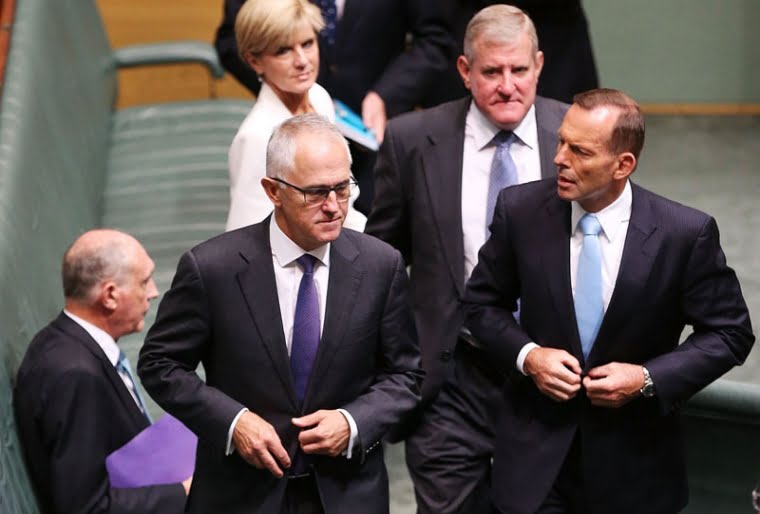Malcolm Turnbull is offering Australia a different style of leadership. He has promised to be more consultative, more collegiate.
Tony Abbott offered the same, but didn’t deliver. And Malcolm Turnbull is not known for being overly mindful of others’ opinions. But he will have to be – he knows it is the only way to heal the Liberal Party.
That means he will have to rely a lot on other people. His choice of people to fill the cabinet and the outer ministry will also be important in setting the tone and direction of what is essentially a new government.

Given Malcolm Turnbull’s background in the Communications portfolio and his deep knowledge of the digital world, we are likely to see much greater emphasis on Australia’s technological future.
The Abbott government was not so much uninterested in science and technology as ignorant of it, with the notable exception of Turnbull himself. There was initially not even a Minister for Science. The CSIRO was gutted, climate science sidelined, and NICTA defunded and ultimately destroyed as a separate entity.
Then there is the NBN. Malcolm Turnbull saved it from destruction, but at the cost of a significant downgrading of its capabilities. The arguments about the pros and cons and cost-effectiveness of the Conroy model versus the Turnbull model will never be resolved, but the reality is that we are building a government owned broadband infrastructure provider that is in the process of totally altering the Australian telecommunications landscape. That will not change, and its outlook can only improve.
So, what will science, R&D and technological innovation look like in a Turnbull-led Australia?
The first point to consider is that Turnbull, despite his age (60) is essentially a digital native. He made $50 million from Australian Internet pioneer Ozemail 20 years ago, and as an information junky he has always seen the benefits of ICT – which does, after all, stand for information and communications technology.
Turnbull understands digital disruption, probably the most important challenge – and opportunity – facing business and society in the 21st century. Tony Abbott and his mates did not even know what the term meant. And one of his last and most significant acts as Minister for Communications was the creation of the Digital Transformation Office and the appointment of Paul Shetler to lead it.
The DTO will be an important part of how Turnbull’s government will operate. It is unlikely to remain a small agency in the Department of Communications, and will become much larger and more substantial than would ever have happened under Tony Abbott.
Turnbull has 12 months at most to recast the government he leads before he faces an election. It is likely he will go the full distance, though circumstances may intervene to force his hand. Whatever the case, he will be a man in a hurry, as he has been all his life.
The first step is the appointment of his lieutenants, those charged with executing his promise of a different way of doing things and his vision of where Australia is headed (which for now he needs to be quiet about).
Less important than who fills which role is who is filling the top role, and Mr Turnbull will definitely set the tone, but the key to good government is execution. That is what the cabinet and the outer ministry will be responsible for.
From a technology viewpoint, the appointment of a replacement to his former position of Minister for Communications is most important. Heir apparent is his former deputy, Parliamentary Secretary Paul Fletcher, but his accession is by no means assured. He was a Turnbull backer and is a former Optus executive, but his performance has been underwhelming.
Another possibility is South Australian Senator Simon Birmingham, who in opposition was Coalition spokesman for Communications in the Senate, where he also served on the Select Committee for the NBN. The current Communications spokesman in the Senate, Mitch Fifield, is also in the race. He is a strong Turnbull supporter.
A Turnbull Government will ensure an expanded role for science. Tony Abbott did not even see the need for a Minister of Science, an oversight remedied late last year with the appointment of Ian Macfarlane to the role, where it is subordinate to his primary role as Minister for Industry. It may not happen immediately, but if Turnbull is re-elected next year expect Science to become a portfolio and Ministry in its own right again.
Mr Macfarlane has also been the Abbott Government’s standard bearer in its attacks on renewable energy. Mr Turnbull is constrained by the right wing of his party from shifting the Government’s stance on climate change too far, at least in the short term, but government-sponsored hostility to Australia’s poorly treated renewables sector is likely to abate. Malcolm Turnbull doesn’t have a problem with wind farms.
Few in Australia’s technology scene will regret the passing of the Abbott Government. The standard of debate has been demeaned, key technologies have been hobbled, and the very existence of the scientific method questioned.
Malcolm Turnbull had been criticised as arrogant and self-centred – ‘it’s all about Malcolm’ – which has been an easy charge to level against him. To that we can now add disloyalty – it is unlikely Tony Abbott’s supporters will ever forgive him.
But if an inflated sense of self-importance and a predilection to self-interest were sufficient to preclude one from public office, we would have very few candidates. On any count, a Turnbull Government will mean a much more conducive atmosphere for technology and innovation in Australia.
Do you know more? Contact James Riley via Email.

